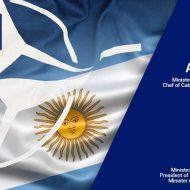The Plague of Wuhan
Lurking upon the unrefrigerated mystery meats of Wuhan city’s Huanan open air market, the Coronavirus struck its first human prey on the eve of a new decade. After jumping to humans, the virus spread with the ferocity of a wildfire across China and eventually made its way to a number of other countries – mostly in neighboring Southeast Asia.
To date, over 20,000 people have reportedly contracted the disease and more than 450 have perished from it.
However, these figures could have been much higher if it weren’t for the Chinese government’s swift response to this health crisis. At least 15 Chinese cities have been quarantined, checkpoints across the country are screening travellers, and two fully-equipped hospitals were constructed for Wuhan in a matter of days – all under the direct supervision of the Communist Party’s Politburo.

Pixabay
The World Health Organization (WHO) Director-General said he was “very impressed” by China’s response and that “it’s actions actually helped prevent the spread of Coronavirus to other countries.”
Even a CNN opinion column was published with the title, “China’s unprecedented reaction to the Wuhan virus probably couldn’t have been pulled off in any other country.”
And yet, large swathes of the Western Media immediately tried to turn this “Public Health Emergency of International Concern” into an opportunity to push their anti-China political agenda.
Anti-China Propaganda
“We need facts, not fear. We need science, not rumors. We need solidarity, not stigma.” – Li Song, Chinese Ambassador for disarmament at the United Nations in Geneva.
Despite significant evidence that China’s overall response to the coronavirus prevented a potentially much graver situation from spiralling out of control, elements of the Western Media seem determined to form its own counter-narrative with selective information.
An article from The Guardian published earlier in the outbreak, for example, highlights unverified claims that Chinese hospitals were “not testing patients” for the virus. A number of western sources such as The New York Timescontinue to publish speculation that China is vastly underreporting the number of confirmed Coronavirus cases and an ex-FDA chief has even claimed there are probably “tens of thousands” of unreported cases.
The same outlets which are contributing to widespread fear of the Coronavirus, however, rarely reported on the western world’s massive annual Influenza death count in the past, which reached a record high of 80,000 people in the United States alone for the 2017-2018 flu season. According to the Center For Disease Control (CDC), 10,000 Americans have already diedfrom Influenza this flu season – an affliction with which the international medical community has long been familiar.
But as the virus’ seriousness has continued to grow, mainstream media articles have begun to play down the Coronavirus threat in comparison to the seasonal flu. Why?

Flickr
Previous Pandemics’ Influence on History
Perhaps their editors had second thoughts about how pandemic hysteria would negatively affect the society in which they live as well.
Viruses of international concern historically have had profound impacts on the societies in which they propagated. The Black Death is probably the most extreme example, which killed 25 million on the European Continent throughout the 14th and 15th centuries.
Many historians purport that this enormous loss of the Feudal system’s enserfed workforce directly gave birth to the capitalist system in which we live today. The Landed Gentry of Western Europe realized that without their peasants – they would starve to death just like anyone else. To encourage the few peasants who survived to continue to farm their land, the ruling feudal class began paying high wages to their workers instead of demanding unpaid labor – an event which gave birth to the modern working class. World renowned economic historian Immanuel Wallerstein accredits the ultimate development of capitalism’s unevenly developed world to precisely this occurrence in history.
Other examples include the early 20th century Spanish Influenza, which political scientist Andrew Price Smith says helped tip the balance of power in favor of the allied powers in WWI, and the African Swine Flu outbreak in Cuba that the UN called the “most alarming event” of 1971. Six years after the latter, the American newspaper Newsdaypurported that the virus was introduced with the help of the CIA to foster opposition against Fidel Castro and the communist government.
Conspiracy Theories & Current Threat To Status-Quo
As with any event of international importance, conspiracy theories concerning the origins of the Coronavirus have already surfaced across the internet. In 2018, a Business Insiderreport quoted Microsoft founder Bill Gates saying that the “sense of urgency is lacking” for a new disease that could potentially kill 30 million people in a mere 6 months. Some on Reddit have capitalized on this statement, and used financial ties between the Bill and Melinda Gates Foundation and the UK-based Pirbright Institute, to claim that the Gates family is profiting from the coronavirus’ spread.
Even Republican U.S. Senate candidate Shiva Ayyadurai claimed “the coronavirus is PATENT owned by the Pirbright Institute.”
Another website called Twisted Arm published an article that claimed the Federal Emergency Management Agency called on President Trump to impose martial law in the United States. The story has already circulated throughout Facebook, despite a statement from FEMA’s Press Secretary which denied the claim’s validity.
For now, there haven’t been any particularly shocking revelations to give much credence to these theories and, thanks to modern medicine and the Chinese government’s efforts, the extent of the damage caused by the coronavirus outbreak is relatively low in comparison to the pandemics mentioned above.
As for a potential slackening of China’s rapid economic growth, mainstream media outlets are predicting serious consequences. According to a Wall Street Journal article, many Chinese factories owned or subcontracted by Apple, Tesla, and Anheuser-Busch are facing significant staff disruptions and even potential closures as a result of the coronavirus. The article also mentions that China is the world’s biggest oil importer. With one of its main oil and gas hubs being located in Wuhan, the price of crude oil has dropped 16% since the coronavirus was identified – as a result of decreased demand.
Foreign Policy pointed to the coronavirus’ knock-on effect both on the country’s stock market, which has already seen severe drops in the price of several major stocks, and supply chains – disrupted by inconsistent air traffic and falling commodity prices.
With the U.S. – China trade war in full swing, information like this certainly looks promising for Washington. Donald Trump himself triumphantly declared that the coronavirus will have “a very good ending for us,” shortly after the WHO declared a global health emergency.
But Beijing doesn’t seem very worried.
Deputy Head of the National Development and Reform Commission Lian Weiliang said, “We are fully capable and confident of winning the battle against the epidemic caused by the novel coronavirus, and we have confidence in minimizing its impact on the economy.”
As the virus continues to spread, we still have no way of knowing if it will have such a profound effect on the global system as its viral predecessors. Will it simply fissile out? Or are we staring down the barrel of something more menacing? Only time will tell.









Leave a Reply